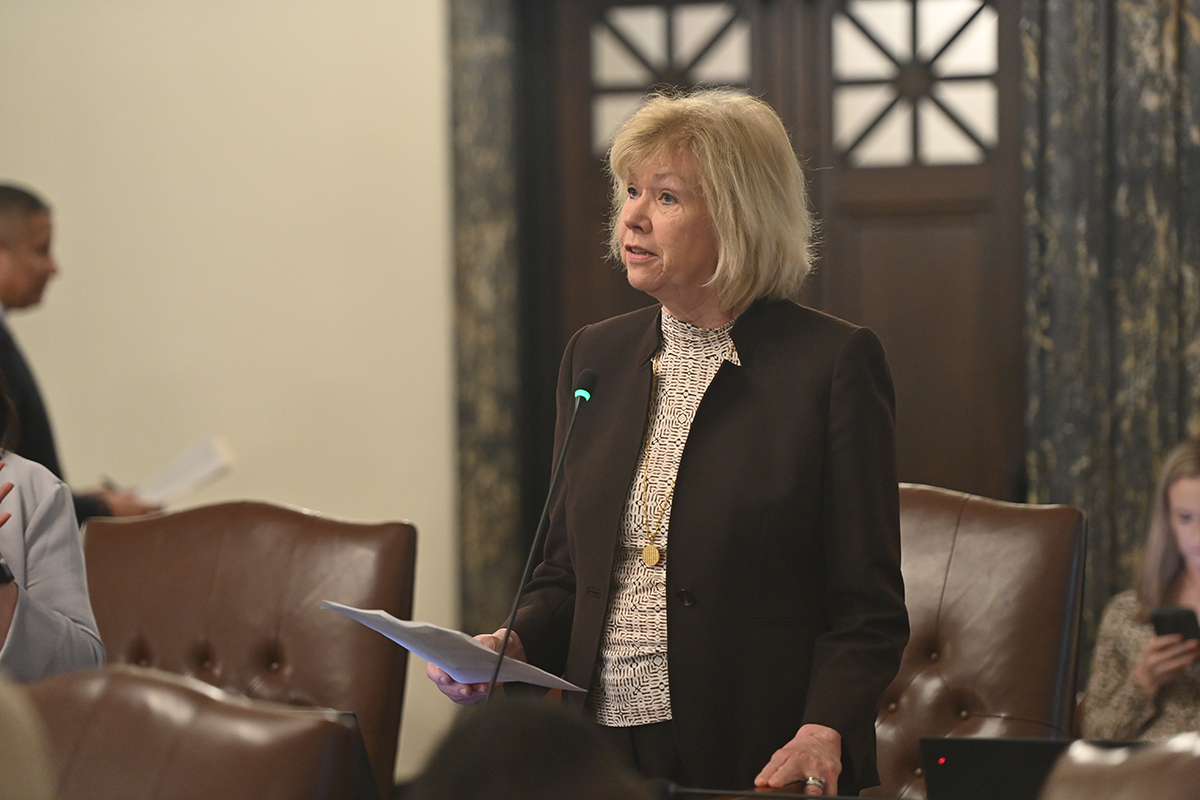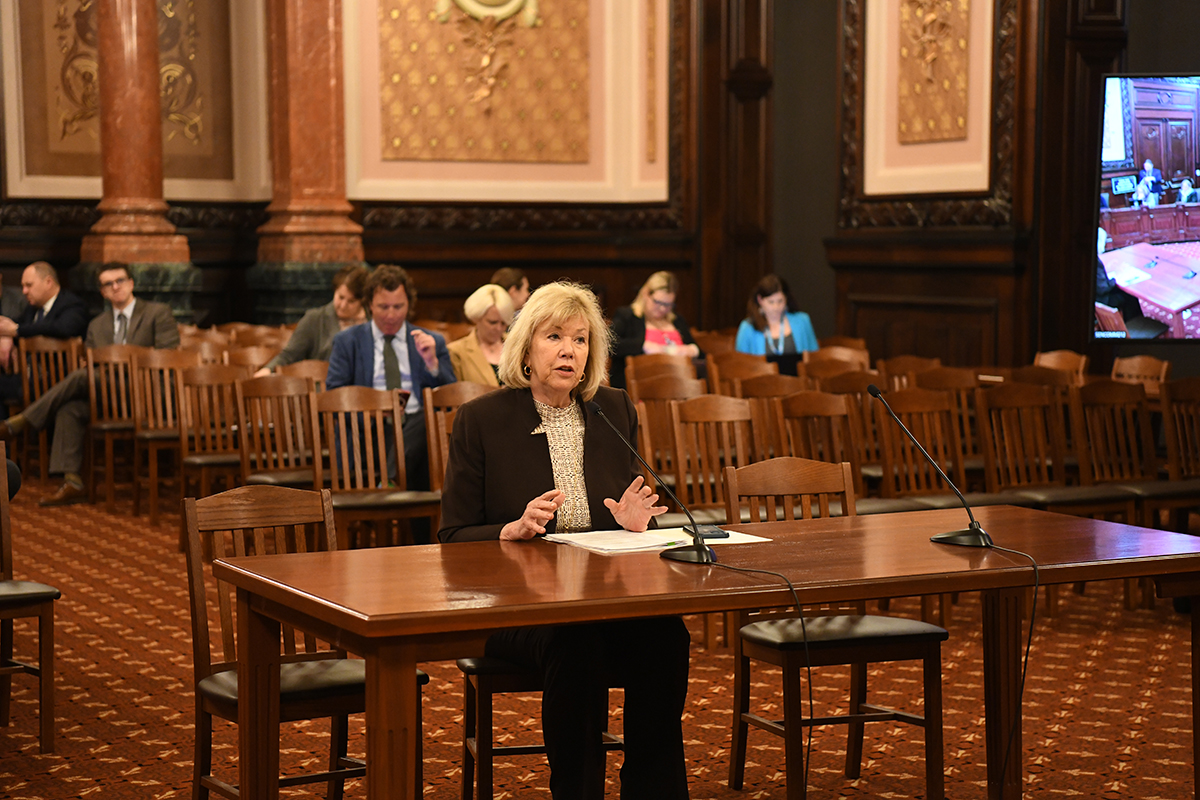- Details
- Category: Features

HIGHLAND PARK – All Illinois pregnant women on Medicaid can now access the important RSV vaccine from pharmacies thanks to the efforts of State Senator Julie Morrison, who has been working with state officials to make health care more accessible and equitable.
Effective Nov. 20, the Illinois Department of Healthcare and Family Services removed the requirements for additional documentation of informed consent beyond the standard methods used for vaccinations and prior authorization for the RSV vaccine, which is the maternal Respiratory Syncytial Virus Vaccine.
"The RSV vaccine is very important for pregnant women during this time of year, when RSV and respiratory illnesses tend to spike," said Morrison (D-Lake Forest). "I want to thank state officials at HFS for recognizing the need to guarantee pharmacy access to the RSV vaccine for all pregnant women on Medicaid."
The Illinois Department of Public Health made the following recommendations in September 2025 regarding RSV vaccination for individuals who have not been previously vaccinated:
- All pregnant people during weeks 32 through 36 of pregnancy
- Adults ages 50 years through 74 years at increased risk of severe RSV disease
- All adults ages 75 years and older
“This is welcome news for women and children, but the work cannot stop there,” said Morrison. “We need to continue working on vaccine literacy and continue our outreach efforts. Women need to know not only are these vaccines more accessible, but they are safe, effective, and essential.”
For more information on the RSV vaccine, click here.
- Details
- Category: Features

SPRINGFIELD – Duchenne Muscular Dystrophy – also known as DMD – is a rare disorder, and severe if not caught early enough to be treated. State Senator Julie Morrison sponsored a law that will require all newborns to be screened for DMD.
“DMD is a devastating disease that tragically takes the lives of children far too soon,” said Morrison (D-Lake Forest). “This law will increase newborn screening and early intervention for this rare but fatal disease.”
Duchenne Muscular Dystrophy is a genetic disorder caused by a change in the dystrophin gene affecting about 20,000 babies each year worldwide. It is characterized by the progressive loss of muscle, which results in deterioration of the skeletal, heart, and lung muscles. Because the dystrophin gene is found on the X-chromosome, it primarily affects males, while females are typically carriers.
By the time the symptoms of DMD are detected, it is typically too late to treat. Additionally, it takes 2.5 years on average to diagnose after caregivers first notice symptoms – giving parents little to no time to receive help for their children. Senate Bill 2658 will require each newborn to be screened for the disease, giving those diagnosed the ability to receive effective treatment.
“Early diagnosis allows for the highest chance of survival,” said Morrison. “This law will save precious lives.”
Senate Bill 2658 was signed into law Friday and takes effect immediately.
- Details
- Category: Features

SPRINGFIELD – State Senator Julie Morrison passed a law to bring more diversity to clinical cancer trials.
“Increasing the diversity of those participating in clinical cancer trials will have a positive impact on the ability to study how the trial treatments might affect a wider segment of the population,” said Morrison (D-Lake Forest). “This law will pave the way for higher participation from historically underrepresented communities.”
Under the new law, the Illinois Department of Public Health will work with the University of Illinois and other relevant organizations to conduct a study examining what demographics are currently underrepresented in clinical trials, identify barriers to participation and pinpoint ways to improve outreach to these communities. IDPH will report the findings of this study to the General Assembly by July 1, 2026, as well as establish a website with relevant information from the study.
“This law is one of many I have championed to improve cancer treatment and research,” said Morrison. “Cancer fatalities have fallen in the past 30 years and I am committed to continuing that downward trajectory.”
House Bill 5405 was signed into law Friday and goes into effect Jan. 1, 2025.
- Details
- Category: Features

SPRINGFIELD – Continuing her efforts to make voting more accessible, State Senator Julie Morrison championed a newly signed law to help people in veterans’ homes, nursing homes and hospitals cast their ballots in a safe and secure way.
“Voting disparities among people with disabilities is a pressing issue,” said Morrison (D-Lake Forest). “Increasing opportunities for voters with disabilities to utilize vote by mail will have a positive impact on their participation.”
House Bill 4488, among other things, will allow election authorities to deliver vote by mail ballots to voters who live in veterans’ and nursing homes, hospitals and mental health facilities, in addition to the authorities' preexisting ability to administer supervised, on-site voting.
This vote by mail initiative is just one part of a bigger package of proposals to increase voting accessibility and make elections more transparent.
“This compilation of provisions will improve the efficiency and equity of our state’s elections,” said Morrison. “The rate at which Illinois voters show up to the polls has dropped in recent years and this measure provides paths to turn this stat around.”
House Bill 4488 was signed into law Monday and takes effect immediately.
More Articles …
- Morrison urges Illinois youth in DCFS care to take advantage of scholarship opportunity
- Morrison bans harmful pesticides near schools
- Schools to make plans for responding to anaphylactic shock under new law by Morrison
- Morrison congratulates Lake County Children’s Advocacy Center on national re-accreditation
Page 1 of 14





